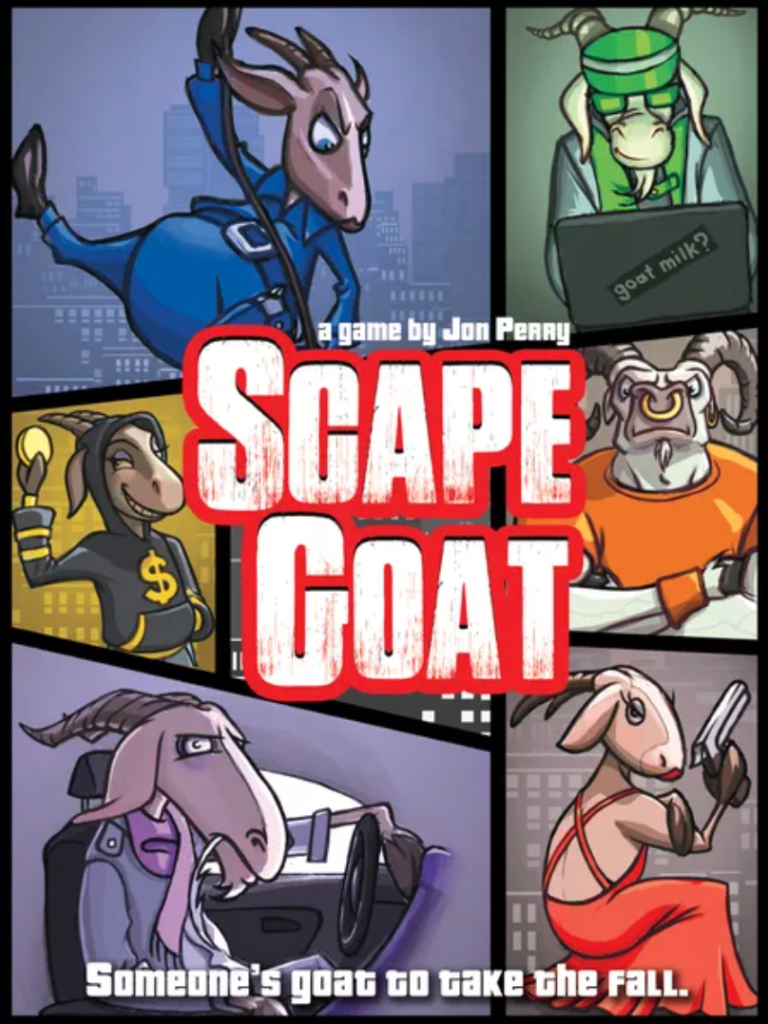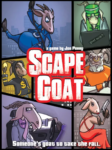- Learning time
- 10 minutes
- First play time
- 40 minutes
Scape Goat
Designed by: Jon Perry
As bank-robbing goats, the players have just pulled off a successful heist. But someone has to take the fall, and some of you have colluded to pin the blame on a single goat. The goat in question will be one player – but whom?
The unlikely catch with Scape Goat is that – at the start at least – nobody can be totally sure it isn’t them. Unlike some deduction games where the traitor/saboteur/other imposter is in the know, with scape goat you’re kind of hoping it isn’t you, and spend the game making sure. If you think it is you, you can still win by going to the cops. But if it turns out it wasn’t – that’s not good either.
Scape Goat uses a canny grid system to decide who the scape goat will be. Before the game begins dice are rolled to decide a number, and everyone looks up the number on their own personal (and hidden) grid. Everyone is told the scape goat is a certain player. But the player in question is told someone else is the scape goat – in essence, the game lies!
Play is reasonably simple – on your turn you move yourself (represented by a token) to one of four locations, and take the action there – you must move and can’t take the same action as on your last turn. The locations are all about sharing or stealing knowledge – players begin with two goat cards and use the locations to look at other player’s hands, swap cards with a player or swap a card with some communally-available ones. Critically, the non-scapegoat players are trying to make sure that when the time comes to dob in the scape goat comes, everyone one of them has a card of the scape goat’s colour: when an accusation is made, all non scapegoat players must reveal a matching goat card: let’s say for example, the scape goat is the blue player. Red accuses them, revealing a blue card. For the non scapegoats to win, Yellow and Green must also reveal a blue card. If they do – congratulations! You win, and the scapegoat loses. If someone doesn’t have a blue card, the accusation fails, and now blue knows at least one of you thinks they’re the scapegoat!
The catch is that as you move around the locations, you must drop off and pick up goat cards, exchanging one in your hand (of your own colour, if you have it, but if not any colour you like) with the goat card that’s there. So if the blue player notices that people are picking up blue cards and leaving behind other coloured cards – such as green – rather consistently, they may suspect they’re the actual scapegoat, even though they were told green is. So on their turn they can run to the cops, and if they do so before the other goats accuse them – they win!
The guru's verdict
-
Take That!
Take That!
Although Scape Goat has no fighting or player elimination (save for the actual winning and losing) it's not for the faint-hearted.
-
Fidget Factor!
Fidget Factor!
Absent - when it's not your turn you absolutely must pay attention to what the other players are up to.
-
Brain Burn!
Brain Burn!
Rules-wise there's no burning here. Figuring out everyone's motives - and the possible fate of your own potentially-scapegoated self - is where it's at.
-
Again Again!
Again Again!
It's probably too tense to keep playing over and over in one sitting, but Scape Goat is a game that thrives on what the players bring to it.





Sam says
There's something unintuitive about Scape Goat, something slightly tricky to explain, but if you enjoy the paranoia and tension it propagates, it's really worth persisting with. What quickly becomes apparent is that it's not just the scapegoat who's worried - everyone is. The scapegoat doesn't want to leave it too late to run to the cops, and the non-scapegoats don't want to accuse too early. But navigating everyone into a position for an accusation is slowly giving away the drip-drip of information to the actual scapegoat... that they are the actual scapegoat. It's bubbling over with suspicions, paranoia, intrigue - and if those things do it for you, Scape Goat delivers in spades.